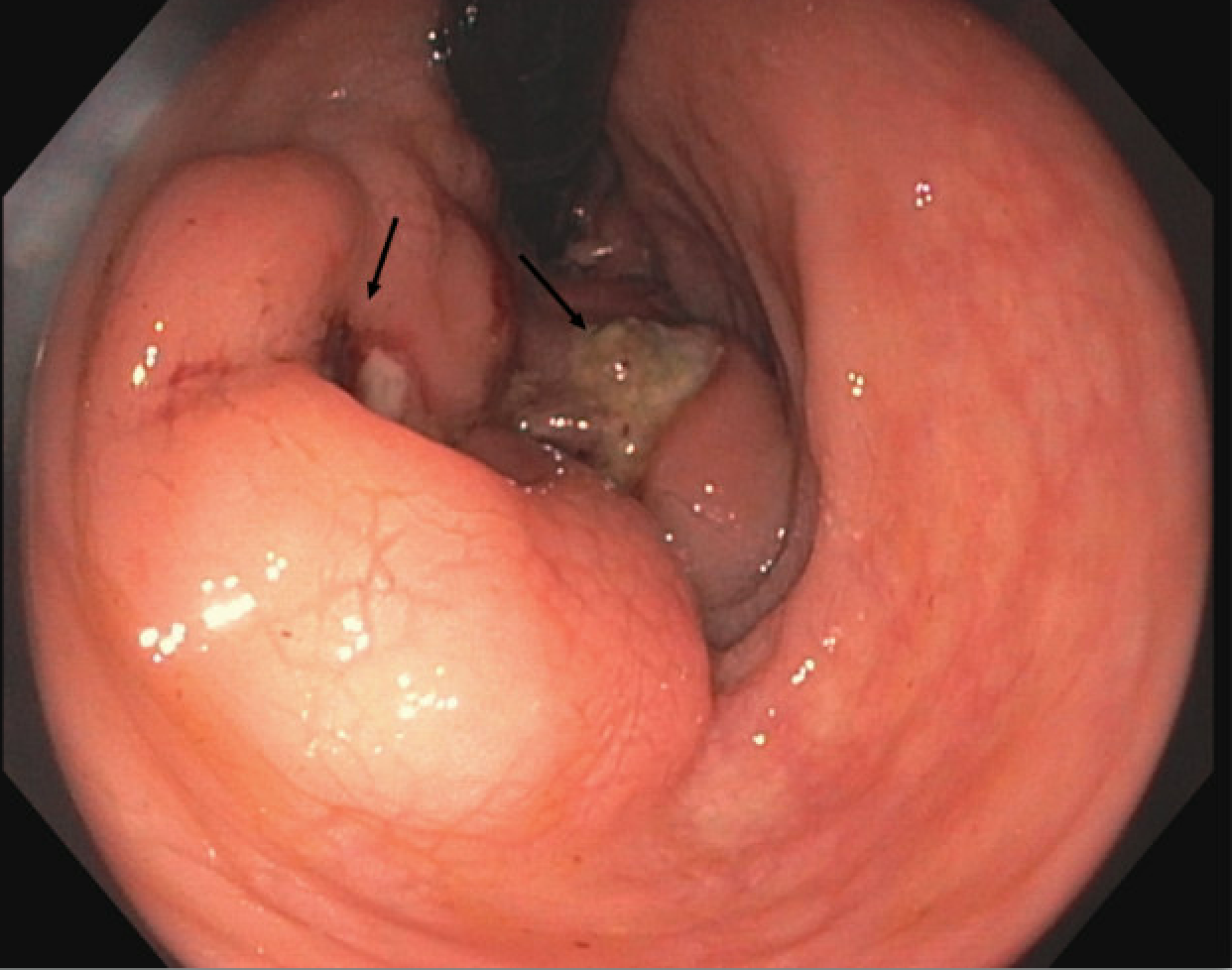Tuesday Poster Session
Category: GI Bleeding
P5288 - A Case of Plasmablastic Lymphoma Masquerading as Proctitis
Tuesday, October 28, 2025
10:30 AM - 4:00 PM PDT
Location: Exhibit Hall

Pembroke Nash, III, MD (he/him/his)
Atrium Health Wake Forest Baptist
Kernersville, NC
Presenting Author(s)
Pembroke Nash, MD1, Noah Weinstein, 2
1Atrium Health Wake Forest Baptist, Kernersville, NC; 2Wake Forest University School of Medicine, Winston-Salem, NC
Introduction: Plasmablastic lymphoma is a rare subset of lymphoma that has increased incidence in patients infected with HIV. In this vignette we present a case of recurrent rectal bleeding due to a case of plasmablastic lymphoma.
Case Description/
Methods: A 33 year old male with a past medical history of HIV, syphilis, anal condyloma and positive HPV 16 presented to the hospital with recurrent rectal bleeding. Initial workup was pertinent for anemia, leukocytosis and worsened kidney function. CT Imaging of the pelvis revealed an 8.0 x 7.0 cm lower rectal mass. An endoscopic evaluation with biopsy was performed which revealed an ulcerated mass in the anal canal (Figure 1). The pathology revealing chronic active proctitis with severe fibrinous ulceration, but no evidence of malignancy. Due to high clinical suspicion for malignancy, further biopsies were obtained through direct visualization which showed an anal condyloma with low grade dysplasia and inflammation. The bleeding was controlled through direct cauterization. The patient returned to the hospital one month later in acute renal failure secondary to ischemia from continued rectal blood loss. MRI at this time showed a large mass circumferentially involving the entirety of the anus and rectum. A lymph node biopsy was obtained which showed discohesive cells with a high nuclear to cytoplasmic ratio and prominent nuclei with plasmacytoid morphology. These were CD45-LCA, CD138, MUM-1, c-MYC positive and CD20 negative which is consistent with plasmablastic lymphoma. The cells also tested positive for Ebstein-Barr virus. Patient was started on the EPOCH chemotherapy regimen, which consists of etoposide, vincristine, cyclophosphamide and doxorubicin and continues to follow with oncology. He is currently tolerating treatment well.
Discussion: Plasmablastic lymphoma is a rare cause of rectal bleeding, and in this case required repeated biopsy to find a definitive diagnosis. It occurs most frequently in patients with HIV or are otherwise immunosuppressed and cells are often EBV positive. There is no current standard of care and EPOCH is only one of the chemotherapy routines that are used. In patients who are HIV positive, antiretroviral therapy is an important part of treatment.

Figure: Figure 1. Retroflexed View of Rectum Showing Ulcerated Mass
Disclosures:
Pembroke Nash indicated no relevant financial relationships.
Noah Weinstein indicated no relevant financial relationships.
Pembroke Nash, MD1, Noah Weinstein, 2. P5288 - A Case of Plasmablastic Lymphoma Masquerading as Proctitis, ACG 2025 Annual Scientific Meeting Abstracts. Phoenix, AZ: American College of Gastroenterology.
1Atrium Health Wake Forest Baptist, Kernersville, NC; 2Wake Forest University School of Medicine, Winston-Salem, NC
Introduction: Plasmablastic lymphoma is a rare subset of lymphoma that has increased incidence in patients infected with HIV. In this vignette we present a case of recurrent rectal bleeding due to a case of plasmablastic lymphoma.
Case Description/
Methods: A 33 year old male with a past medical history of HIV, syphilis, anal condyloma and positive HPV 16 presented to the hospital with recurrent rectal bleeding. Initial workup was pertinent for anemia, leukocytosis and worsened kidney function. CT Imaging of the pelvis revealed an 8.0 x 7.0 cm lower rectal mass. An endoscopic evaluation with biopsy was performed which revealed an ulcerated mass in the anal canal (Figure 1). The pathology revealing chronic active proctitis with severe fibrinous ulceration, but no evidence of malignancy. Due to high clinical suspicion for malignancy, further biopsies were obtained through direct visualization which showed an anal condyloma with low grade dysplasia and inflammation. The bleeding was controlled through direct cauterization. The patient returned to the hospital one month later in acute renal failure secondary to ischemia from continued rectal blood loss. MRI at this time showed a large mass circumferentially involving the entirety of the anus and rectum. A lymph node biopsy was obtained which showed discohesive cells with a high nuclear to cytoplasmic ratio and prominent nuclei with plasmacytoid morphology. These were CD45-LCA, CD138, MUM-1, c-MYC positive and CD20 negative which is consistent with plasmablastic lymphoma. The cells also tested positive for Ebstein-Barr virus. Patient was started on the EPOCH chemotherapy regimen, which consists of etoposide, vincristine, cyclophosphamide and doxorubicin and continues to follow with oncology. He is currently tolerating treatment well.
Discussion: Plasmablastic lymphoma is a rare cause of rectal bleeding, and in this case required repeated biopsy to find a definitive diagnosis. It occurs most frequently in patients with HIV or are otherwise immunosuppressed and cells are often EBV positive. There is no current standard of care and EPOCH is only one of the chemotherapy routines that are used. In patients who are HIV positive, antiretroviral therapy is an important part of treatment.

Figure: Figure 1. Retroflexed View of Rectum Showing Ulcerated Mass
Disclosures:
Pembroke Nash indicated no relevant financial relationships.
Noah Weinstein indicated no relevant financial relationships.
Pembroke Nash, MD1, Noah Weinstein, 2. P5288 - A Case of Plasmablastic Lymphoma Masquerading as Proctitis, ACG 2025 Annual Scientific Meeting Abstracts. Phoenix, AZ: American College of Gastroenterology.
